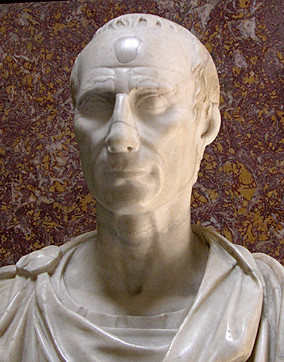Comparing The Lives of Caesar and Cleopatra to the Play and the Film
 |
The play, Caesar and Cleopatra, by Bernard
Shaw is a drama based on the historical facts of these characters. Although
Shaw claims to be giving concrete evidence, the play has several fictitious
elements.
|
Cleopatra, the film, covers the lives of Caesar
and Cleopatra more accurately than the play in it's portrayal of these
characters' personalities. However some points are changed in order to
perpetuate long held perceptions of this legendary couple.
|

|
Caesar according to the Play
He comes across as a supremely caring man who shows interest in the welfare
of everyone. Caesar even shows great mercy to his enemies when it would be
safer for him to punish them. For example, he spares the lives of all the
Egyptians that previously conspired against him with Pompey. He doesn't even
look at their names, certain that they will be his friends now that he has
proved himself (Shaw 79).
Caesar According to the Film
The character of Caesar in the film is much like that in the play. He shows
mercy towards those he conquers. However, in his mercy, he is furthering
himself. The film actually combines Caesar's real personality with that in
Shaw's play. He is put in a very favorable light and is made out to be the
benevolent ruler who continually works for peace and justice. However, he also
continually looks out for himself; and all compassion disappears when it does
not suit him. For example, when Cleopatra informs him that the great Library of
Alexandria is burning down because of the soldiers' carelessness, Caesar shows
no distress and refuses to do anything about it.
The Real Caesar
In reality Caesar was an opportunist. He used every chance for advancment
to its greatest extant. This was clear when he was elected to office in 65 BCE.
He spent an enormous amount of borrowed money, holding banquets for the people
and hosting various games, in order to
secure the favor
of the public. For the most part, he performed kind deeds only when they fit
into his plans for success.
Cleopatra According to the Play
Shaw portrays Cleopatra as a silly vindictive child with limited
intelligence. She believes every story that she hears, no matter how improbable
it is. This superstitious quality is evident when she tells Caesar at their
first meeting that the Romans are horrible creatures and "are coming to
eat us all"(Shaw 28). Shaw makes her a child in order to make her silly
way of speaking and immature beliefs believable.
Cleopatra according to the Film
She is portrayed as highly intelligent. They reveal Cleopatra's skill in
the art of languages, mentioning that she is fluent in nine.
Cleopatra is also seen as extremely attractive and seductive. The fact that
she is played by Elizabeth Taylor ensures that the focus will be on her
physical characteristics. This emphasis reflects a popular belief that a
woman's body is her greatest asset, and a man will only be attracted to her
because of this.
The Real Cleopatra
In addition to her highly acclaimed intelligence, Cleopatra was known for
her daring personality. She was not afraid to take risks, and in this respect,
she was much like Caesar. When she smuggled herself into the palace to meet
with Caesar by wrapping herself
in a rug, she
displayed a courage that greatly impressed him. This imaginative method in
which she achieved her goal showed a determination of character closely
reflecting Caesar's.
The real Cleopatra proved that looks are not always what attracts. She was
actually not a very
handsome woman, but she was well versed in the relevant issues of the time
and was able to converse for hours with anyone. Cleopatra's allurement came
from this vast knowledge and ability to perceive people's ambitions. Her
elequence of movement and speech were unmatched. Like Caesar, she made full use
of the talents and opportunities available to her.
Faith Racette

